Masters 2021: Tiger Woods, Rory McIlroy, Jordan Spieth - momentous memories and meltdowns
- Published
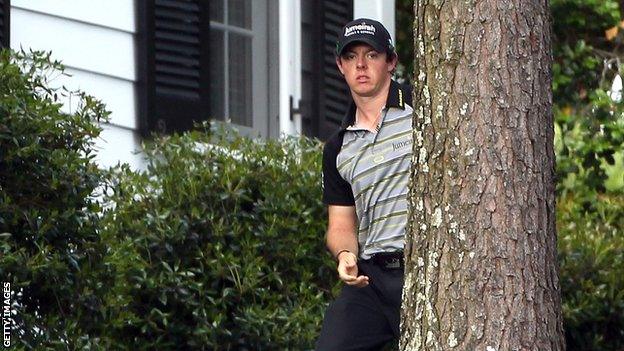
Rory McIlroy never recovered after finding a spot so far left on the 10th that it is never usually seen on television
"Every shot is within a fraction of disaster. That's what makes it so great."
When South Africa's Gary Player won the first of his three Masters titles 60 years ago, he was the first non-American champion at Augusta National.
To mark the occasion, here's a look back at the most memorable anniversaries being reached this year - is it really 10 years since Rory McIlroy squandered his best chance to win? And 20 since Tiger Woods held all four majors?
Five years since… Willett wins after Spieth sinks (2016)
Jordan Spieth's calamitous seven at the par-three 12th
In 2016, 22-year-old Texan Jordan Spieth looked nailed on to become just the fourth player to win successive Masters titles - joining Jack Nicklaus, Nick Faldo and Tiger Woods.
The 2015 champion had a five-shot advantage heading into the back nine on Sunday.
But, after dropping shots at the 10th and 11th, Spieth spectacularly met his downfall at the par-three 12th, finding the water twice and slumping to a quadruple-bogey seven.
The American later admitted he turned to his caddie Michael Greller and said: "Buddy, it feels like we are collapsing.
"It was just a lack of discipline coming off the two bogeys instead of recognising I was still leading the Masters by a couple of shots."
Englishman Danny Willett took full advantage with birdies on the 13th, 14th and 16th holes to post a bogey-free five-under-par 67 to win on five under.
And as Masters tradition dictates, defending champion Spieth then had the ignominy of putting the Green Jacket on Willett's shoulders.
Willett receives the Green Jacket of the Masters champion
10 years since… Rory's Masters meltdown (2011)
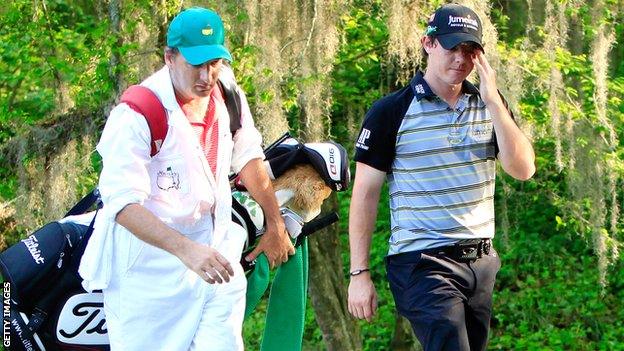
Rory McIlroy has had six top-10 finishes in his past seven Masters appearances
In 2011, Rory McIlroy shot a five-under-par 67 to be the youngest player leading after the first round at the Masters.
The 21-year-old followed up with further breathtaking play on Friday and Saturday to lead by four going into Sunday's final round.
"I was still one shot ahead going into the 10th and then things went pear-shaped after that," said the Northern Irishman after shooting a final-round 80.
McIlroy's tee shot on the par-four 10th was already heading left when it ricocheted further left off a tree. He would eventually get on the green with his fifth shot and two putts later he was back at eight under par after a triple-bogey seven.
His nerves were further shredded by a three-putt bogey on 11 and, after finding the heart of the green on the par-three 12th, he contrived to take four putts from inside 20 feet for a double bogey. Six shots gone in three holes and he had plummeted to five under par.
His dreams of a first career major had turned into a nightmare.
"I'll have plenty more chances I know and hopefully it will build a bit of character in me as well," said McIlroy, who has gone on to win four majors but the Masters still eludes him.
South Africa's Charl Schwartzel, who started the day four behind McIlroy, chipped in for birdie on the first and holed his second shot from the fairway on the par-four third.
He then became the first player in the tournament's history to birdie each of the final four holes as he claimed his only major to date.
20 years since… Woods' Tiger Slam (2001)
Masters 2001: Woods seals 'Tiger' slam
Tiger Woods went into the Masters looking to become the first player to win four consecutive majors, having won the US Open, Open Championship and US PGA Championship in 2000.
It was dubbed the 'Tiger Slam'.
He had already joined four other legends of the game - Jack Nicklaus, Gary Player, Ben Hogan and Gene Sarazen - in winning a career Grand Slam and while the calendar Grand Slam was beyond him, all eyes were on the 25-year-old at Augusta National.
Unfazed, he opened with rounds of two under, six under and four under to put himself one clear of Phil Mickelson going into Sunday.
Woods also came under pressure from world number two David Duval, who made seven birdies in his first 10 holes.
But, as the back nine finally bared its teeth, Duval and Mickelson both bogeyed the 16th and after Duval missed a birdie attempt on the last, Woods had two putts to win the Masters. He only needed one to secure his second Green Jacket and complete a remarkable feat.
25 years since… Norman's Sunday explosion (1996)
Nick Faldo overhauls Greg Norman in 1996
It was set to finally be Greg Norman's year at Augusta.
Always the bridesmaid - he would have three runners-up finishes and eight top fives by the end of his Masters career - the Australian held a six-shot lead over closest challenger Nick Faldo as Sunday dawned.
But, squandering final-round leads in majors was his speciality - he did it nine times - and a nervy front nine let Faldo close to within two shots.
Norman's chip on the 10th was loose and he slipped to a bogey. On the 11th, he could have saved par with a three-foot putt - but he didn't.
Amen Corner was offering no mercy to Norman and he double-bogeyed the short 12th.
He had already hit his ball in Rae's Creek the day before and on Sunday he knocked a seven-iron into the water. The six-shot lead had turned into a two-shot deficit.
A wonderful eagle attempt on the 15th glided past the hole and Norman dropped to his knees. Faldo matched the birdie to stay two clear.
But the 16th proved fatal. Norman flicked his tee shot into the water and walked off with another double bogey.
Faldo added another birdie at the last to win by five shots and embraced a shell-shocked Norman, who later said: "I wouldn't like to see a player do what I did either. I screwed up, I know I screwed up."
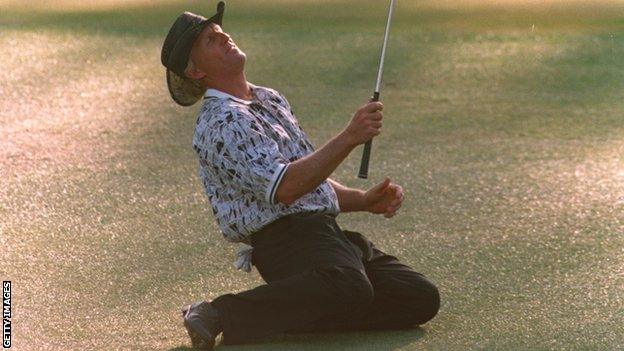
Norman would also twice finish runner-up at the US Open and US PGA Championship - but he did win The Open in 1986 and 1993
30 years since… Woosnam wins it for Wales (1991)
Ian Woosnam wins 1991 Masters
Ian Woosnam was good at top-10 finishes in majors but had yet to win one of golf's most coveted prizes.
The Welshman was world number one and outstanding rounds of 66 and 67 on Friday and Saturday gave him a one-shot lead and a pairing with home favourite Tom Watson.
Spain's Jose Maria Olazabal, playing in the group in front, had three birdies in his opening seven holes to draw level with Woosnam but three successive bogeys from the eighth looked to have derailed his challenge.
Woosnam reached the turn with a three-shot lead over Watson on 12 under, but what followed was an Augusta Sunday back-nine classic.
The Welshman bogeyed the 10th while Watson birdied to close the gap to one but the 41-year-old American gave that shot back at the 11th and dunked his tee shot in the water on the 12th as he carded a double-bogey five.
Then, there was a backup on the 13th. It was so congested that Woosnam was sat on a bench only a few feet away from Olazabal watching the Spaniard hit his tee shot.
There was almost 15 minutes between Woosnam holing his par putt on the 12th and hitting his tee shot on the par-five 13th. It was a tee shot that he hooked into the water down the left.
He walked off with a six, while Watson played two sumptuous shots to reach the green and holed a 15-foot eagle putt to join Olazabal on nine under, one behind Woosnam.
Olazabal then birdied 14 and 15 to get to 11 under. Woosnam matched the birdie on 15 to join the Spaniard on that number. And Watson, to raucous cheers, holed an eight-foot eagle putt to make it a three-way tie for the lead.
All three players parred the next two holes. Who could hold their nerve down the last?
Olazabal was first and he failed to get up and down from a greenside bunker and could only bogey. Watson, an eight-time major champion, was errant off the tee and hit his second into the same bunker. He almost holed from there but missed the par putt.
Woosnam, who had deliberately hit his tee shot way out left, took several minutes to clear a path through the patrons. He was fractionally short of the green with his second and then putted his third to seven feet.
It was the putt he had dreamed of. "You're on that putting green when you're a little kid, thinking you're Gary Player, Jack Nicklaus and Tom Watson," he said.
"And there I am with a seven-foot putt for the Masters." The ball dropped and Wales had a Green Jacket.
35 years since… Nicklaus wins record 18th major (1986)
1986 Masters: Jack Nicklaus wins 18th major aged 46
Jack Nicklaus wasn't supposed to win this.
At 46, he was apparently past his prime and harshly, the Golden Bear was now being dubbed the 'Olden Bear' in some circles.
Nothing happened in the first three days to change that view.
Until suddenly, a birdie at nine on Sunday gave him another gear. More birdies followed, at 10, 11 and 13. And then a barely believable eagle at 15, followed by two more birdies on 16 and 17. It saw him post a seven-under-par 65 and set the clubhouse target at nine under.
But he needed other players to falter.
Step forward Norman and Seve Ballesteros.
Spaniard Ballesteros had eagled the par-five eighth and 13th holes to get to nine under but a trip to the water on the 15th and a three-putt bogey on the 17th saw his challenge end.
Norman also looked sunk after he double-bogeyed the par-four 10th, but four successive birdies from the 14th saw him draw level with Nicklaus on nine under.
The Australian hit the perfect tee shot on the 18th but pushed his second right of the green - he later said it would be the one shot in his career that he would most like to play again. He chipped on but then missed a 15-foot par putt that would have forced a play-off.
The win was Nicklaus' final major.
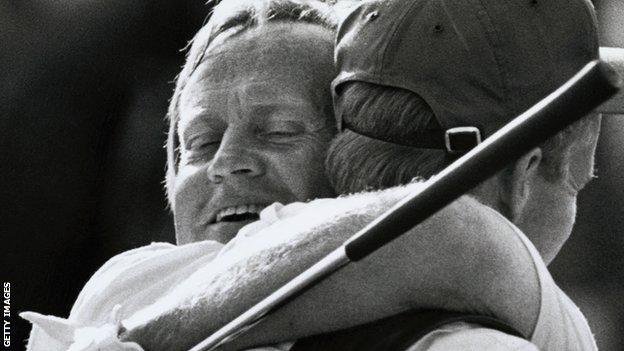
Jack Nicklaus won his record sixth Green Jacket 23 years after he had won his first
60 years since… Player breaks US stranglehold (1961)
The Masters was an American tournament - every winner since its inception in 1934 had come from the United States.
Player was a determined South African who had claimed The Open in 1959 and was a golfer trending rapidly upwards.
Defending champion Arnold Palmer was the home favourite and the pair were locked at seven under par after two rounds, four clear of the field.
By the end of Saturday, Player led Palmer by four.
Sunday turned into an extraordinary washout. Several greens were flooded in a thunderstorm and, despite Player having completed 11 holes and leading Palmer, who had played nine, by two shots, play was abandoned and all scores erased.
Everyone returned on the Monday.
Player was out around 30 minutes before Palmer. He opened with two birdies and was 12 under after nine. Palmer had three birdies on the front nine to keep in touch on nine under.
Then the South African capitulated on the par-five 13th. A drive into the woods, an iron into the creek and three putts saw him post a double-bogey seven and he also bogeyed the 15th to set the target at eight under.
But Palmer could not take advantage. He missed birdie putts from fewer than 15 feet on five consecutive holes from the 13th but par golf had left him with a one-shot lead on the par-four last.
His tee shot was sound. His second was not. Into a greenside bunker. The splash out careered through and off the green. He elected to putt back but his fourth shot pulled up 15 feet shy of the hole. He needed to hole it to force a play-off. He didn't.
"I thought sixes only happened to other people," he said as Player celebrated an unlikely victory.
The South African also won in 1974 and '78. It would take until 1980 for another non-American to don the Green Jacket - Seve Ballesteros.
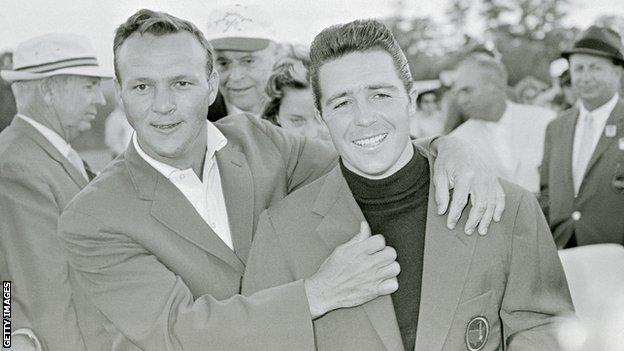
As defending champion, Palmer put the Green Jacket on Player's shoulders

Deeply Human: Why are we the exception to the norm when it comes to sex?
Wind in the Willows: Six life lessons the four-legged friends could teach us
